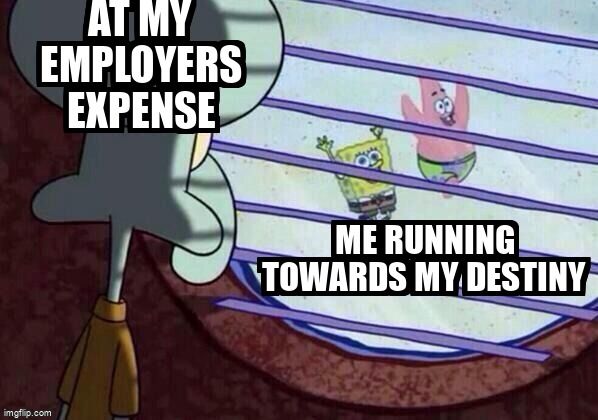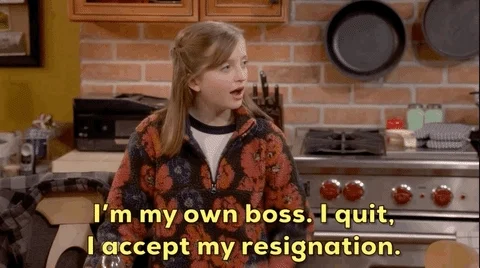Are you currently working 40 hours a week or so at a job you absolutely hate, or dreaming about doing something more meaningful?
To spend so much time pouring yourself into unfulfilling work is quite a demoralizing feeling.

I feel for you. I, too, worked a job I couldn't stand, which eventually led me to quit. Enduring a job you hate can make you feel:
stagnant in your personal and professional life
unmotivated to maintain relationships
like you're a weakened version of yourself
Before you get carried away with how happy you'll be once you quit your job, there are some important things to consider.
1. Understand Your Why
Before I quit my job, the reasons that drove me to do so included:
feeling uninspired
micromanagement
low pay
believing there was something out there better for me
After quitting, however, it didn't take long to realize I spent more time being excited about running away from my job rather than paying attention to what I was running towards.

To quit your job, you need to understand exactly what your "why" is.
Instead of deciding to quit your job just because it makes you sad, try starting with:
“I would like to quit this job in order to _________________.”
Framing your thoughts in this way helps you direct your thoughts to concrete goals ahead.

2. Have an Exit Plan
When I quit my job, I had an idea of things I wanted to accomplish but I hadn't created a specific course of action to accomplish those goals. Without a clear vision, distractions got in the way and my motivation dipped.

If I could quit my job again, I'd create a solid plan of action rather than leave it up to chance. Failing to plan is a plan to fail, as the saying goes. In your plan, be sure to include:
what specific goals you're aiming for
how long you plan to be out of work
what certifications or training you'll need to complete in order to embark upon your new line of work

As time goes on, you can tweak your plan if necessary, but having a clear outline for how you plan to reach your goals will help you stay on track during your transition.
3. Reset Your Budget
Luckily, I did have 6+ months in savings before I quit. Unless you're quitting your job to go straight into another new role, you definitely need 3-6 months worth of savings to help you to get through this time.

Creating a budget will help you to stay mindful of living within your means while you are waiting for your new source of income. While you create your budget, make sure to consider:
how much money you have currently saved up
the monthly amount you'll need for your basic necessities
whether you need a part-time job to help sustain you in the meantime
Quiz
What are the top 3 factors to consider when creating a post-employment budget?
4. Follow the Protocol for Resigning
You want to be able to leave your job with your dignity intact, so make sure you follow workplace protocol and quit in the appropriate way.
Luckily, I was very communicative about my decision to quit, which left my employer and me on good terms. This worked in my favor because I needed my employer's help at a future date.

To start the process of quitting, first:
Schedule a meeting with your supervisor.
Be straightforward. Discuss your plans and thank your employer for the opportunity.
If you're in good standing, request a reference.
Bring along your signed resignation letter.

5. Consider Health Insurance
Before quitting your job, be sure to develop a plan for how you handle health insurance. Health insurance, especially in the US, has a pesky way of often being tied to employment. The options for health care in the US system can include:
keeping your job-based policy through the COBRA Health Plan
purchasing an Affordable Care Act (ACA) plan
applying for Medicaid if you had a low income while working
joining your partner's job-based health insurance if that's available to you

Even if you generally have good health, you want to be on the safe side and stay insured just in case anything comes up.
6. Nurture and Build Your Support System
If there was one thing I really wish I knew before I quit my job, it's how much a support system is needed in the aftermath.
Not only is quitting your job exciting and jarring at the same time — you also may find that you'll lose contact with people who share the same professional goals as you.

In your transition, be sure to surround yourself with people who are uplifting, whether that’s family, friends, and most importantly, people in the field that you aspire to be in yourself.
Quiz
Jamie has spent quite some time dreaming about quitting her job as a nurse to start her own private practice. She is tired of putting it off but is also fearful of leaving her stable income behind. What should she do to make her dream a reality?
Take Action

Having a goal, and a plan to meet it when you quit your job will provide you with the direction necessary to come out on the other side successfully.
In order to make the best of your transition, be sure to:
Need some more time to figure out if quitting your job is right for you? Check out this Byte: Follow these 3 steps to decide if you should quit your job
Your feedback matters to us.
This Byte helped me better understand the topic.
